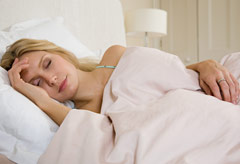Extroverts more likely to suffer effects of sleep loss
According to new research, social butterflies are more likely to suffer from the effects of sleep loss

According to new research, social butterflies are more likely to suffer from the effects of sleep loss
Surprisingly, outgoing people who spend up to 12 hours mingling during the day are more likely to struggle on minimal sleep than introverts, according to a new report.
US army researchers studied the links between sleep, social interaction and personality in 48 volunteers aged 18 to 39 who were kept awake for 36 hours.
Research psychologist Dr. Tracy Rupp said: ‘Extroverts exposed to socially enriched environments showed greater vulnerability to subsequent sleep deprivation than did extroverts exposed to an identical but socially impoverished environment.’
The study, conducted by the Centre for Military Psychiatry and Neuroscience at Walter Reed Army Institute, found that those classed as introverts did better in reaction tests and found it easier to stay awake.
The findings, published in the Journal of Sleep, also report that those extroverts who were denied social contact did well, suggesting that it is social stimulation that tires out the part of the brain linked to alertness.
Professor Mark Blagrove, a neuroscientist from the University of Swansea, published similar research on the effects of sleep deprivation on mood. He concluded that extroverts are more vulnerable to mood change folowing a lack of sleep.
Celebrity news, beauty, fashion advice, and fascinating features, delivered straight to your inbox!
‘We suggested that extrovert people might be heavily influenced by the sleep-deprived appearance of people in the group around them,' he said.
‘This supports a slightly simpler argument that the extrovert is more likely to be influenced by a perception of what is going on in the group.’